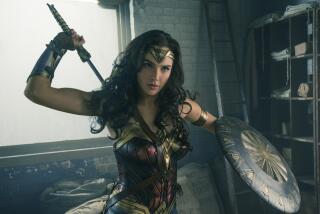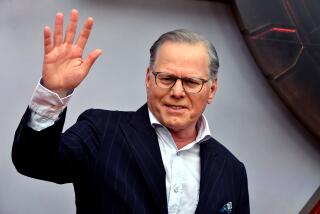Activision’s modern warfare
- Share via
On a warm Monday afternoon three months ago, the producers of the hit video game Call of Duty found their offices under invasion.
Security guards with Secret Service-style radio earpieces showed up on the second floor of Infinity Ward headquarters in Encino on March 1 and refused to tell employees why they were monitoring the entrances. Staffers congregating in the hallways suspected it had to do with the mysterious absence that day of their longtime bosses Jason West and Vincent Zampella.
“I was confused and afraid,” recalled Jon Shiring, a former Infinity Ward programmer.
The next afternoon, Bobby Kotick, chief executive of Infinity Ward-owner Activision Blizzard Inc., made a rare trip from his corporate office in Santa Monica to announce that West and Zampella had been fired. The security guards were making sure the two former executives didn’t enter the offices.
In the studio’s kitchen, he told Infinity Ward employees that he regretted axing the key creators of the multibillion-dollar Call of Duty military action games but that he had no choice. He offered no explanation.
Since West and Zampella’s departure, 35 out of Infinity Ward’s nearly 100 employees have quit, including the lead designers of Call of Duty: Modern Warfare 2, the best-selling video game of 2009. Most are now suing their former employer.
Infinity Ward’s near implosion has brought to the fore the rocky relationship between the freewheeling game culture and the buttoned-down ethos of Activision’s Kotick, who recruits many of his executives from consumer-product giants including Procter & Gamble Co. and who readily admits he doesn’t play video games.
Activision is behind the game industry’s biggest titles, including Guitar Hero, the Tony Hawk skateboarding games and World of Warcraft, which has 11.5 million online subscribers. The company is known for Hollywood-style marketing, rapid-fire sequels and frequent acquisitions. Its market value is $13.5 billion, more than twice that of its biggest competitor, Electronic Arts Inc.
Kotick, however, has drawn the ire of gamers thanks to his comments, including when he said he wanted “to take all the fun out of making video games.” (He later said it was a humorous aside.) The Facebook group Gamers against Bobby Kotick and Activision, which seeks to “stop him before other companies copy him,” has about 1,680 members.
“In the development community, Activision is not very popular right now. I’ve heard some pretty vitriolic assessments since the Infinity Ward situation started,” said Randy Pitchford, president of game studio Gearbox Software. “But they are still one of the largest publishers in the world, and that power has value.”
This week, 45,000 professionals from the $45-billion global video game business, which generates more money than movie ticket sales and is a key industry for California, will gather in Los Angeles for the annual E3 industry conference. But the events at Infinity Ward have cast a shadow over Activision as it prepares to show off its new games in a splashy demonstration at Staples Center on Monday night.
Kotick, who according to filings with the Securities and Exchange Commission has netted more than $240 million from stock sales over the last two years, mixes regularly with Hollywood moguls, whose names he drops in conversation. Though he tends to favor sweaters over suits, the 47-year-old University of Michigan dropout owns a private jet and attends the yearly conference for media bigwigs in Sun Valley, Idaho.
At Activision’s Santa Monica headquarters, he works in a suite walled off from the rest of the office and accessible only by keycard. Employees have nicknamed it “the capsule.”
The Long Island, N.Y., native is a major Republican donor and is supporting Meg Whitman’s bid for governor. He sits on the board of the Los Angeles County Museum of Art and has a collection of mid-20th century works by artists such as Willem de Kooning worth more than $100 million.
The growth of Activision — once a tiny firm that Kotick and partners took over in 1990 for $440,000 — into a $13-billion behemoth has been accompanied by high-profile clashes with game creators. The publisher has sued and been sued by development studios including Double Fine Productions Inc., Harmonix Music Systems Inc. and Spark Unlimited.
Lawsuits are common among entertainment companies, but Activision’s legal brawls underscore its willingness to bulldoze Hollywood’s first commandment: Thou shalt not alienate the creative talent that makes thee rich.
Three days after West and Zampella were forced out, they sued Activision, contending that the company fired them to avoid paying $36 million in royalties. In a countersuit, the publisher said that the two breached their contract by attempting to decamp to rival Electronic Arts, labeling them “self-serving schemers.”
“It is unusual that disputes get this personal,” said Dan Offner, who heads the video game practice at law firm Loeb & Loeb in Los Angeles. “But there is a lot at stake here.”
Kotick shrugs off such criticisms, arguing that his company’s record isn’t unusual.
“I think our history of over 20 years speaks for itself,” he said. “We have acquired more than 17 independent studios, and virtually all of them are still run by their founders. That says a lot about our culture of partnership.”
People who worked at Activision in the 1990s, when it had fewer than 100 employees and for a time occupied one floor in an office building in Brentwood, say Kotick had one goal.
“Bobby always had his sights on pushing Electronic Arts aside and becoming No. 1 in the industry,” said Josh Resnick, a former director of production for Activision.
Activision’s first hit came in 1999 with Tony Hawk’s Pro Skater, which pioneered the company’s winning formula: Identify a hit and crank out new versions as frequently as the market will bear. Over the next decade, Activision made nine Tony Hawk sequels.
In 2003, Activision bought Call of Duty-creator Infinity Ward and went on to release six games in seven years, selling more than 62 million units.
Three years later, after Guitar Hero became a surprise hit by allowing players to live out their rock star fantasies, Activision acquired RedOctane, owner of the Guitar Hero brand name, but not Harmonix, which made the game’s software. In less than four years, Activision released 13 Guitar Hero sequels and spinoffs.
Although the strategy has been mostly successful, gamers complain that it comes at the cost of fresh ideas.
Kotick’s biggest coup came in 2008, when he orchestrated a merger with the game division of the French conglomerate Vivendi. His prize: Blizzard Entertainment, maker of World of Warcraft.
Kotick is counting on Irvine-based Blizzard, whose games are popular in China and South Korea, to help Activision expand into Asia and move all of its games online.
“The world will become more connected,” said Blizzard President Mike Morhaime. “We want to be the leader in online gaming in the future.”
Last year, Activision Blizzard collected $4.3 billion in revenue and earned $113 million in net income, despite a sales slump for the industry.
“Bobby played a masterful hand in building the company, and investors love him for it,” said John Taylor, managing director at Arcadia Investments, a shareholder in Activision. “But that doesn’t mean he hasn’t ruffled some feathers along the way.”
Those ruffled have included well-regarded game developers.
Its decision to buy Guitar Hero without Harmonix was followed by a lawsuit in which the developer and its parent company Viacom Inc. said it was underpaid royalties for sequels that Activision produced. The case was settled after a yearlong private arbitration.
Double Fine’s game Brutal Legend was one of several titles on Vivendi’s roster that were not released after the merger because, Kotick said at the time, they were “franchises that don’t have the potential to be exploited every year across every platform.” Activision sued the developer after EA agreed to publish the game instead, saying that it never officially canceled Brutal Legend. The parties settled out of court.
Miles Locker, a chief counsel of the California labor commissioner for 16 years who reviewed several of Activision’s suits, said the publisher’s accusations in its legal filings had not been run-of-the-mill.
“The tone of these allegations are aggressive and drastic,” he said.
Kotick said his company’s language had been “measured and appropriate.”
After West and Zampella’s dismissal, Activision altered the schedules of royalty payments to Infinity Ward developers for Modern Warfare 2. Instead of basing payments on the previous quarter’s sales, as they were for Modern Warfare 1, they have been stretched over a two-year period until Modern Warfare 3 is completed.
Many of the Infinity Ward employees who subsequently left have joined West and Zampella’s new video game studio, Respawn Entertainment.
“I assumed there would be a sweetener to get us to stay,” said Shiring, among the former Infinity Ward staffers suing Activision on allegations of unpaid royalties. “I was surprised when I found out they were going to withhold money. It felt like they didn’t appreciate our talent.”
An Activision spokesman said the company “retains the discretion to determine the amount and the schedule of bonus payments.”
Infinity Ward is now hiring to regroup for Modern Warfare 3, while another Activision studio is working on November’s Call of Duty: Black Ops and a third is producing a spinoff. Neither has as successful a track record as Infinity Ward.
“Infinity Ward is still a fantastically talented team of people, and there is no shortage of interest among talented people who would love to be part of it,” Kotick said. “This is a studio that will continue to be incredibly successful.”






